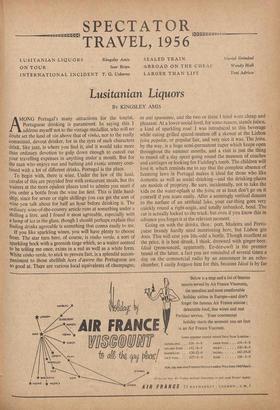SPECTATOR TRAVEL, 1956
LUSITANIAN LIQUORS Kingsley Amis SEALED TRAIN
Muriel Grindod
ON TOUR Ivor Brien ABROAD ON THE CHEAP
Wendy Hall
INTERNATIONAL INCIDENT T. G. Usborne LARGER THAN LIFE
Toni Adrian
Lusitanian Liquors BY KINGSLEY AM1S AMONG Portugal's many attractions for the tourist, Portuguese drinking is paramount. In saying this I address myself not to the vintage medallist, who will no doubt set the land of viz: above that of vinho, nor to the really committed, devout drinker, for in the eyes of such characters drink, like jazz, is where you find it, and it would take more than ordinary devotion to gulp down enough to cancel out your travelling expenses in anything under 'a month. But for the man who enjoys sun and bathing and exotic scenery com- bined with a lot of different drinks, Portugal is the place.
To begin with, there is wine. Under the law of the land, carafes of this are proyided free with restaurant meals, but the waiters at the more opulent places tend to admire you more if You order a bottle from the wine list first. This is little hard- ship, since for seven or eight shillings you can get the sort of wine you talk about for half an hpur before drinking it. The ordinary wine-of-the-country article runs at something under a shilling a litre, and 1 found it most agreeable, especially with a lump of ice in the glass, though 1 should perhaps explain that finding drinks agreeable is something that comes easily to me.
If you like sparkling wines, you will have plenty to choose from. The star turn here, of course, is vinho verde, a sort of sparkling hock with a greenish tinge Which, so a waiter seemed to be telling me once, exists in a red as well as a white form. White vinho verde, to stick to proven fact, is a splendid accom- paniment to those shellfish, hors d'oeuvre the Portuguese are so good at. There are various local equivalents of champagne, or asti sputnante, and the two or three I tried were cheap and pleasant. At a lower social level, for some reason, stands faisca, a kind of sparkling rosé. I was introduced to this beverage while eating grilled spiced mutton off a skewer at the Lisbon feira popular, or popular fair, and very nice it was. The feira, by the way, is a huge semi-permanent caper which keeps open throughout the summer months, and a visit is just the thing to round off a day spent going round the museum of coaches and carriages or looking for Fielding's tomb. The children will love it, which reminds me to say that the complete absence of licensing laws in Portugal makes it ideal for those who like domestic as well as social drinking—and the drinking-places are models of propriety. Be sure, incidentally, not to take the kids on the water-splash at the feint, or at least don't go on it yourself if you scare easily. After a seemingly vertical descent to the surface of an artificial lake, your car-thing goes very quickly round a right-angle, and totally unbanked, bend. The car is actually locked to the track, but even if you know this in advance you forget it at the relevant moment.
Going on with the drinks, then : port, Madeira and Portu- guese brandy hardly need mentioning here, but Lisbon gin does. This will cost you 10s.-odd a bottle. Though excellent at the price, it is best drunk, I think, drowned with ginger-beer. Ideal (pronounced, apparently, Ee-dee-owl) is the premier brand of the latter, a fact you are reminded of several times a day on the commercial radio by an announcer in an echo- chamber. I easily forgave him for this, because Ideal is by far the best ginger-beer I have tasted anywhere, with or without gin. Whisky is almost the only foreign drink without a Portu- guese version, and is uniquely expensive. It is therefore de rigueur among some sections of the upper crust, who go in for conspicuous consumption with an energy approached only by Welles's Citizen Kane. Several notable livers, I was told, have become defaced through their owners' heroic allegiance to the highball—a drink they disliked, anyway.
Liqueurs, or drinks drunk at liqueur-time, are abundant. You can get the most popular French ones without difficulty, though at a higher price than their local imitations. The best of these is the so-called triplice, a native cointreau which costs 8d. or 9d. a tot, and the native tot is a large one. The Portuguese are given to putting anis in this without telling you, but perhaps you like that. You will almost certainly like it mixed in with medronha, a sort of calvados made from a sort of arboreal strawberry and with a sort of tree growing in the bottle. I remember that my friend Corporal Beavis, of the ACC, used to run round a field a lot after drinking calvados- `I'm a horse,' he would call : 'I'm a horse'—and I must confess that medronha moved me some small distance in that general direction. It is a drink to be approached sidelong, and I might add here that you would be well advised to treat Portuguese drinks with something more than your habitual moderation until you know the effect they are going to have on you.
The native beer, lastly, is of course a let-down after our own, but much less of a let-down than most foreign beers. Although it tastes of nothing very noticeable, it at least doesn't taste of straw, cardboard or wet dishcloth. However, you will probably not want to waste much time on it when there is so much else available. I cannot end without saying that whatever you drink, and wherever you drink it, you will meet that unfailing courtesy and helpfulness which make Portugal such an agree- able country to visit.











































 Previous page
Previous page